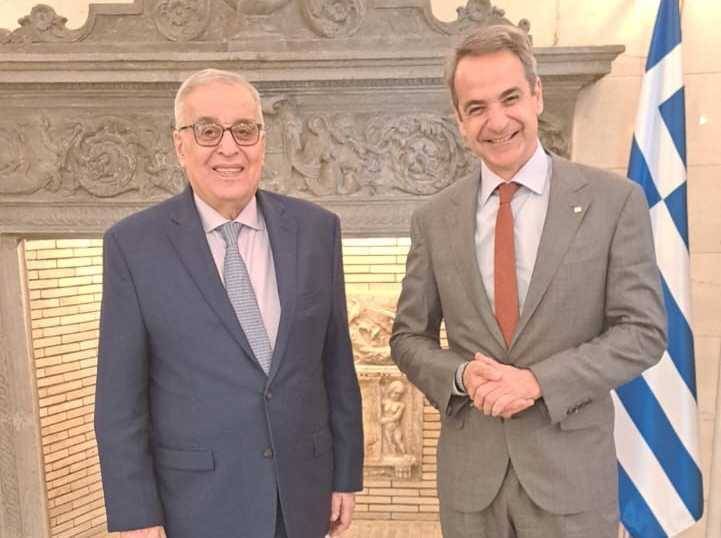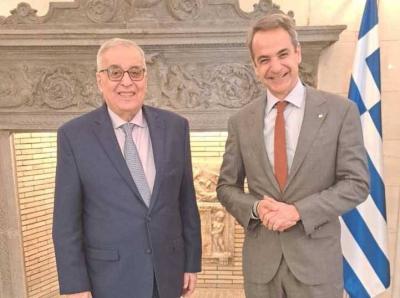Lebanon's Foreign Minister in the caretaker government, Abdullah Bou Habib, conducted an interview with the newspaper Kathimerini on April 11, 2024, moderated by Petros Papaconstantinou, titled: "Abdullah Bou Habib: Athens Can Mediate for Peace. The crisis resulting from the war in Gaza affects not only many countries in the Middle East and Cyprus but Greece as well." The article states: "The regional developments in the Middle East, as the war in Gaza reaches its peak, were the main topic of discussion during yesterday's meeting between Lebanese Foreign Minister Abdullah Bou Habib and Greek Prime Minister Kyriakos Mitsotakis at the Maximos Palace (the Greek government’s headquarters). Shortly after the meeting, we met with the Lebanese official, an experienced diplomat, and this is what he told us:
- What did you discuss, and what was the outcome of your meeting with the Greek Prime Minister?
- We had a very good discussion. The central topic was the crisis in the region, which affects Lebanon and Cyprus, but also Greece. We are all concerned about the developments in Gaza, the conflicts in southern Lebanon, and the issue of Syrian migrants. Three major problems that influence our three countries. We agree with the Greek Prime Minister on a number of important issues.
- Do the recent assassinations carried out by the Israeli army of senior Hamas officials in Beirut and the Revolutionary Guards in Damascus accelerate the possibility of the war expanding from Gaza to Lebanon?
- Of course, we are concerned. Our government and the Lebanese people do not want war. We want peace to prevail, which is why we call for the full implementation of Security Council Resolution 1701 (reached in 2006 after the war between Israel and Hezbollah). This resolution is also referenced by Israel, demanding the withdrawal of Hezbollah forces to the north of the Litani River. Full implementation of Resolution 1701 means, above all, ending the Israeli occupation of Lebanese territory. It also means preventing Israel from violating the sovereignty of our country by land, sea, and air. Additionally, Hezbollah does not maintain barracks in the border area; rather, it has an intermittent military presence that began two or three years ago, while Israeli violations started as early as 2006, immediately after the adopted Security Council resolution.
- Following the outbreak of war in Gaza, Hezbollah began firing at Israelis along the border with Lebanon. What is your government's position on that?
- We would like the hostilities to stop because Israel has destroyed hundreds of homes in southern Lebanon. Many villages have been destroyed, and most agricultural lands are no longer cultivable because the Israeli army is using white phosphorus, which is an internationally prohibited weapon when used in populated areas.
- Greece has developed close cooperative relations with both Israel and Arab countries. Do you believe that Greece can play a mediating role in seeking a peaceful solution?
- Lebanon's relations with Greece have a deep historical significance, dating back to the time of Alexander the Great. In our country, we have many Lebanese of Greek descent, most of whom carry Greek names. Lebanon's relationship with Greece is excellent, and we do not mind that your country enjoys good relations with Israel. In fact, during my meetings in Athens, I urged both Prime Minister Mitsotakis and my counterpart Giorgos Gerapetritis to leverage these good relations with Israel for the benefit of peace in southern Lebanon. This would relieve migration pressure and allow 92,000 displaced Lebanese to return to their homes.
- What is your view on the initiative by Spain and other European countries to gain international recognition for Palestine as a state? Would you like Greece to follow suit?
- Certainly. The Arab League, the Organization of Islamic Cooperation, and the Non-Aligned Movement are already moving in the same direction.
- Your country has historical relations and excellent ties with your neighbor Cyprus. However, recently Cypriot President Nikos Christodoulides accused you of exporting the migration crisis that Cyprus is facing. You met him recently. What was the outcome of that meeting?
- I believe that Cyprus understands the magnitude of the problem we are facing. We do not have the means to stop every ship leaving Lebanon loaded with migrants. Cyprus wants the return of these migrants to Lebanon. We say no, they are Syrians; they should return to Syria. The problem lies with the European Union, which supports them remaining in Lebanon, treating them as political refugees. However, the vast majority of them are migrants (displaced) for economic reasons, and it would be better to provide them with financial support to return to their homes. In the latest census, fewer than two million Syrian refugees and migrants have sought refuge across Europe. There are 2.2 million in Lebanon. You can understand the enormous burden our country is bearing, with its significant economic problems.
The preliminary agreement to establish the Exclusive Economic Zone (EEZ) between Cyprus and Lebanon dates back to 2007. Do you see the issue being resolved in the foreseeable future?
- For now, no, because as you know, we do not have a president; there is institutional vacuum. However, there is no problem between Lebanon and Cyprus that cannot be solved. The Lebanese remember with great gratitude how many managed to escape the flames of the long civil war via Cyprus. We handle the issue with a spirit of flexibility, and as soon as constitutional order is restored, we will seek to resolve it."




